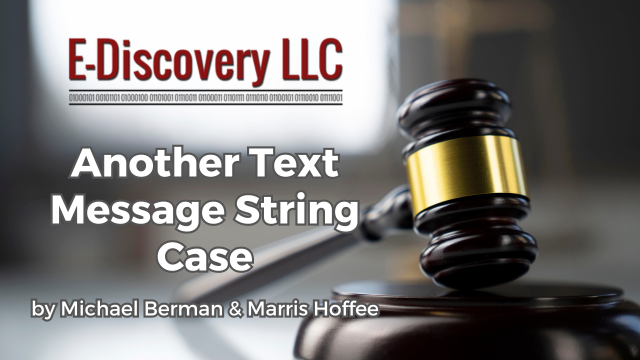
[EDRM Editor’s Note: The opinions and positions are those of Michael Berman and Marris Hoffee.]
Milne v. ProAll Int’l. Mfg., Inc., 2025 WL 1374125 (C.D. Cal. May 12, 2025), addresses the relationship between ESI Protocols and production of text message strings.
The Milne court denied a motion to compel further responses to requests for production. The court recited the general principles governing discovery and requests for production. Id. at *1. It noted that the party moving to compel has the initial burden of demonstrating relevance, while “the party opposing discovery has the burden of showing that discovery should not be allowed, and also has the burden of clarifying, explaining and supporting its objections with competent evidence.” Id. at *2 (quotations and citations omitted).
The court explained that mere suspicion that additional documents exist is insufficient to compel production. See Grossman v. Directors Guild of Am., Inc., 2018 WL 5914242, at *5 (C.D. Cal. Aug. 22, 2018) (citing Unilin Beheer B.V. v. NSL Trading Corp., 2015 WL 12698382, at *5 (C.D. Cal. Feb. 27, 2015) (“A plaintiff’s mere suspicion that additional documents must exist is an insufficient basis to grant a motion to compel.”) (citations omitted)); Ogden v. Bumble Bee Foods, LLC, 292 F.R.D. 620, 628 (N.D. Cal. 2013) (“Absent evidence that [the defendant] is withholding documents in its possession, the court cannot issue an order compelling [the defendant] to produce documents it states it does not have.”).
The Milne court then addressed the text messages. Defendants sought internal communications between plaintiffs or their employees:
Defendants claim that Plaintiffs “refused to produce text messages in a workable format,” alleging such messages that have been produced have been filtered and edited, removing portions of conversations, and lacking useable metadata contrary to the parties’ ESI Protocol agreement, and asserting Plaintiffs did not conduct an adequate search…. Plaintiffs respond that they produced “all responsive text messages within their custody and control,” used an IT professional to export the messages with “full metadata” in a manner that complies with the parties’ agreed-to ESI protocol, and deny that they filtered, edited, or otherwise manipulated text messages…. In response, Defendants assert Plaintiffs had previously conceded that they had “manually separated” some text threads, whereas others were “unfiltered,” which is at odds with their assertion in the Joint Stipulation…. Plaintiffs counter to assert Defendants have not shown any “relevant” metadata is missing and argue that the format used for the production has been used by Plaintiffs since October 2024, without prior complaint.
Milne, 2025 WL 1374125, at *2.
The court ruled that:
In summary: Defendants assert Plaintiffs’ responses do not comply with the ESI Protocol, whereas Plaintiffs assert that they do; Defendants assert Plaintiffs materially manipulated text threads and failed to conduct a proper search; Plaintiffs deny the accusations. The ESI Protocol is an agreement between the parties. It is not a Court Order. Although Defendants aver Plaintiffs’ production format for the emails makes it “challenging” for Defendants to review relevant text messages, Defendants have not shown Plaintiffs failed to comply with Rule 34(b)(2)(E) in producing the text data. Similarly, although Defendants appear to suspect that relevant, responsive information is missing, Plaintiffs have represented that they have produced all responsive text information. On this record, Defendants’ request for an order compelling a further response to RFP Nos. 10-11 is denied. [Emphasis added].
Id.
This decision makes clear that courts will not compel production based on speculation. Absent contrary evidence, courts will defer to the reasonable efforts and good faith representations by the parties.
This decision makes clear that courts will not compel production based on speculation. Absent contrary evidence, courts will defer to the reasonable efforts and good faith representations by the parties.
Michael Berman, E-Discovery LLC, and Marris Hoffee, Keilty Bonadio.
See also ESI Protocol Should Define “Documents” and Address Redaction Based on Irrelevancy (May 14, 2025).
Assisted by GAI and LLM Technologies per EDRM GAI and LLM Policy.



